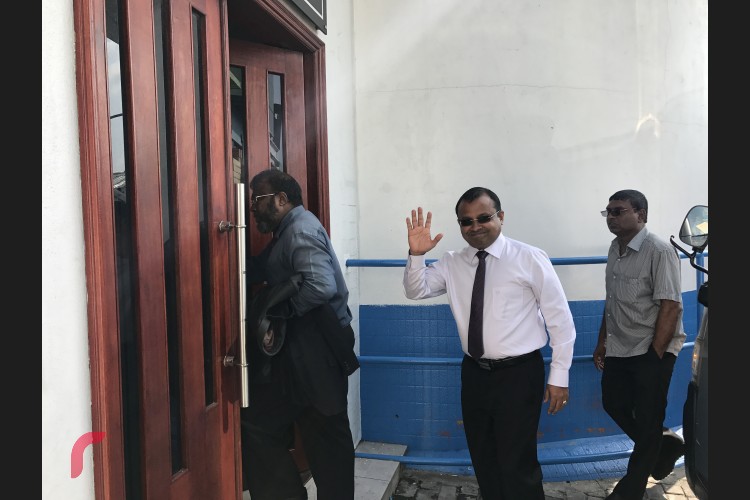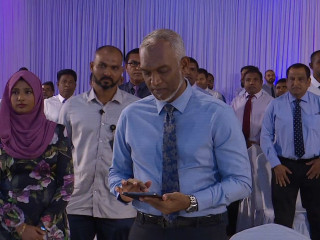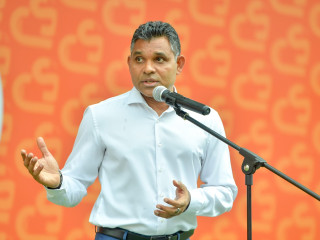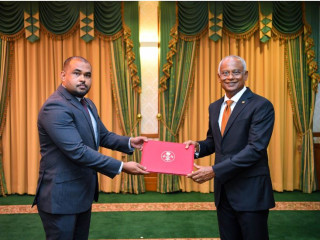The Criminal Court has halted Thursday’s hearing against opposition MP Abdulla Riyaz due to the prosecution’s administrative failure to provide the defence with knowledge of a piece of evidence.
The hearing was held on Thursday and the judges heard evidence from the defence as well as the prosecution – as testimonies to properly clarify the circumstances of the charges.
While the statements were being heard, the court’s bench had inquired about a forensic report on MP Riyaz’s phone which the prosecution had submitted as evidence. Riyaz’s defence stated that they had not been informed of said report during the discovery phase.
When inquired is to why the defence had not been informed of the report, the prosecution stated that it was an administrative failure on their part.
Prior to this, the bench had heard evidence from the defence as well as the aforementioned testimony. Out of the two witnesses that the defence had called, only one had given a statement.
The defence called police officer Ismail Vildhan, who had refused to testify on the grounds that he simply did not wish to do so. Vildhan said that he believes he is the officer whose duty Riyaz had obstructed – as per the allegations.
Riyaz’s lawyer Hisaan Hussein stated that Vildhan’s testimony is imperative for the trial as he could testify whether or not a court warrant was issued on Riyaz’s phone – as he was part of the police’s investigative team.
The bench had decided to forgo Vildhan on the grounds that his testimony – without him wanting to give it – would be under duress.
The defence’s second witness was Ameer Shah, Riyaz’s nephew and one he entrusts with tasks having to do with the mobile device.
Shah said he is tasked with changing settings for the phone, installing and updating applications, and repair work. He had testified that Riyaz ‘almost never’ switches off his phone and that he uses fingerprint access to it and thus never needed a passcode.
Shah further said that he usually sets the passcode for Riyaz’s phone, and that the parliamentarian hardly ever knows the code himself. He further said that he was out of the country when Riyaz was apprehended and that he had given the five-number passcode after having returned.
While the prosecution had put forth three witnesses, the bench had heard testimonies from two. They were both police officers.
Officer Mohamed Adham said that Riyaz had switched off the phone himself when asked to put it on ‘airplane mode’. Adham had reffered to a garauntee given by another officer’s family in making the statement. The defence had argued that it was hearsay and Adham’s testimony, if it is not his own experience, is inadmissible.
The second officer had testified that the phone had already been switched off when the investigation began.
After a police questioning on 2nd April, MP Riyaz said he is facing allegations for refusing to allow officers to access his mobile phone.
On the night of 27th March, Riyaz had reportedly been walking down Maaveyo magu, of which the first half is not very well-lit, when two men – not in uniform – had showed him a warrant and asked him to handover his mobile phone.
Riyaz refused on the grounds that the street was too dark for him to read the supposed warrant, and that he had been attacked on that very road before and so was hesitant to indulge their request.
The parliamentarian, who had served as police commissioner himself, said that the officers had forcefully taken his phone from him.
On the next day, Riyaz had reportedly been shown a warrant stipulating that he reveal the passcode to the phone, which was now switched off.
MP Riyaz said that he never switches his phone off, and always unlocks it using fingerprint access. However, after the police had confiscated it and asked him to unlock it, the phone had been switched off and Riyaz, because he almost never uses it, could not recall the passcode required for initial unlocking after start-up. He had then given them three different passcodes, which were all incorrect.
The police have been investigating allegations that opposition parliamentarians had threatened and bribed pro-government MPs ahead of the, now failed, vote of no-confidence against parliament speaker Abdulla Maseeh.





